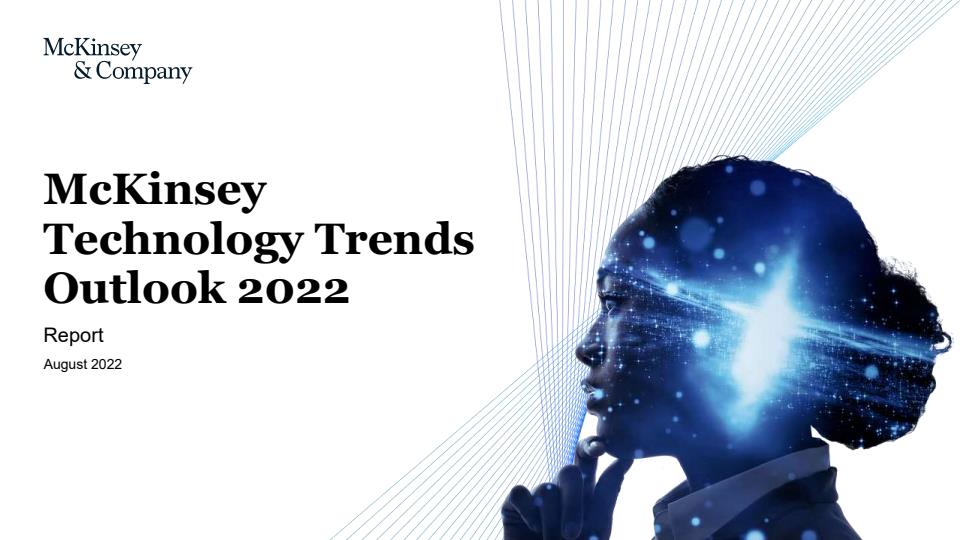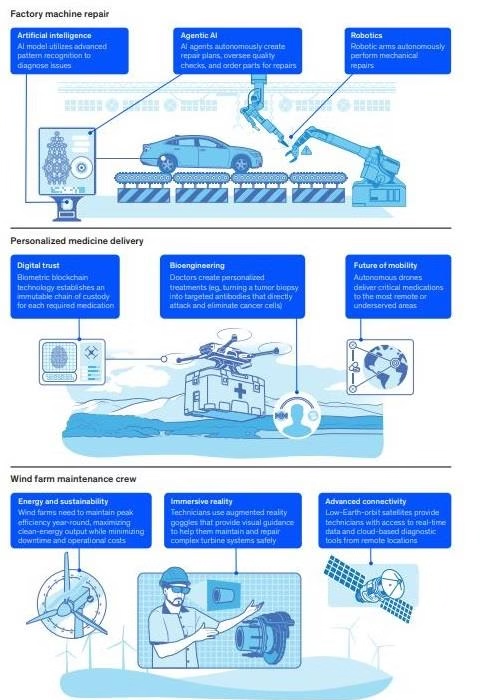“`html
Introduction: Navigating the Future with the McKinsey Technology Trends Outlook 2025
Estimated reading time: 10 minutes
Key Takeaways
- The pace of technological change is accelerating, making it crucial for businesses to stay ahead.
- The McKinsey technology trends outlook 2025 is an essential guide to upcoming technological shifts.
- This post explores the essential business technology trends 2025 identified by McKinsey.
- A significant focus is placed on the McKinsey 13 frontier tech trends set to redefine industries.
- The profound impact of AI on business transformation is a central theme.
- Readers will gain insights into understanding emerging technology in 2025.
Table of contents
- Introduction: Navigating the Future with the McKinsey Technology Trends Outlook 2025
- Key Takeaways
- Unpacking the McKinsey 13 Frontier Tech Trends for 2025
- Deep Dive: The Transformative Impact of AI on Business
- Understanding Emerging Technology in 2025: Challenges and Opportunities
- Strategic Imperatives for Businesses
- Final Thoughts: Embracing the Technological Horizon
- Frequently Asked Questions
The world of business is in a constant state of flux, driven by an ever-accelerating pace of technological advancement. To remain competitive and innovative, organizations must not only keep up but also anticipate the shifts that will shape their industries. In this dynamic landscape, understanding emerging trends is no longer a luxury; it’s a necessity. The McKinsey technology trends outlook 2025 stands as a critical resource, offering deep insights into the technologies poised to redefine the future. This post aims to provide a comprehensive overview of the essential business technology trends 2025 as identified by McKinsey, exploring their profound implications and highlighting key areas of focus, particularly the McKinsey 13 frontier tech trends and the transformative impact of AI on business transformation. By delving into these trends, we seek to equip you with the knowledge needed for understanding emerging technology in 2025.
Unpacking the McKinsey 13 Frontier Tech Trends for 2025
McKinsey’s analysis adeptly categorizes the 13 frontier trends into three pivotal domains: the AI revolution, the frontiers of compute and connectivity, and cutting-edge engineering. This structured approach allows for a clearer understanding of how these powerful forces will interact and shape the business landscape.

AI Revolution
-
Agentic AI: Defined as autonomous digital agents capable of executing multi-step workflows, agentic AI is set to become the digital equivalent of a coworker. These agents will significantly boost productivity, automate complex tasks, and drive innovation by handling intricate processes independently.
*Source:* McKinsey Live Webinars, Future of Asia Podcasts.
-
Artificial Intelligence (Foundation Models & Applied AI): The continuous evolution of foundation models and applied AI is fundamentally transforming industries. Businesses are leveraging these advancements for enhanced automation, sophisticated data analytics, and the creation of hyper-personalized customer experiences that were previously unimaginable.
*Source:* Top Trends in Tech, McKinsey Live Webinars.

Compute & Connectivity Frontiers
-
Application-Specific Semiconductors: The development of custom chips designed for specific computational tasks, especially those related to AI, is leading to substantial performance improvements. These specialized semiconductors are becoming critical for maintaining a competitive edge in the electronics sector and beyond.
*Source:* McKinsey Live Webinars, Future of Asia Podcasts.
-
Advanced Connectivity: Next-generation networks, including 5G and the emerging 6G, are paving the way for seamless, ultra-fast, and highly secure connectivity. This enhanced infrastructure is the bedrock for unlocking entirely new business models and digital services.
*Source:* McKinsey Live Webinars, Future of Asia Podcasts.
-
Cloud and Edge Computing: These distributed computing models, encompassing both centralized cloud infrastructure and decentralized edge computing, offer unparalleled scalability and flexibility. Edge computing, in particular, enables real-time data processing closer to the source of data generation, crucial for latency-sensitive applications.
*Source:* Top Trends in Tech, McKinsey Live Webinars.
-
Immersive-Reality Technologies: Technologies such as virtual reality (VR) and augmented reality (AR) are transforming user engagement. They are creating more compelling customer experiences, facilitating effective remote collaboration, and revolutionizing training and simulation methods across various sectors.
*Source:* McKinsey Live Webinars.
-
Digital Trust and Cybersecurity: As the digital realm expands, so do the threats. Robust safeguards for identity verification, data integrity, and system resilience are paramount. Advanced cybersecurity measures are essential to maintain trust and protect against escalating digital risks.
*Source:* McKinsey Live Webinars, Future of Asia Podcasts.
-
Quantum Technologies: While still largely experimental, quantum computing holds immense potential. It promises to tackle highly complex simulations and optimization problems currently intractable for classical computers, heralding a significant disruptive force across scientific research and industry.
*Source:* Top Trends in Tech, McKinsey Live Webinars.

Cutting-edge Engineering
-
Future of Robotics: Fueled by advancements in AI, robotics is evolving rapidly. AI-powered robots are increasingly being deployed in manufacturing, logistics, healthcare, and service industries, automating tasks, improving precision, and enhancing operational efficiency.
*Source:* McKinsey Live Webinars, Future of Asia Podcasts.
-
Future of Mobility: This trend encompasses the transformation of transportation through electric vehicles (EVs), autonomous driving technologies, and integrated connected infrastructure. These innovations are fundamentally changing how goods and people are transported, impacting urban planning and logistics.
*Source:* Top Trends in Tech, McKinsey Live Webinars.
-
Future of Bioengineering: Advancements in biofabrication, synthetic biology, and genetic engineering are driving significant progress in healthcare, agriculture, and manufacturing. These engineered biological solutions offer novel approaches to disease treatment, sustainable food production, and material science.
*Source:* McKinsey Live Webinars.
-
Future of Space Technologies: Decreasing costs of space access and the proliferation of satellite technology are opening up new markets. These advancements are enabling innovative applications in global telecommunications, environmental monitoring, surveillance, and data provision from space.
*Source:* McKinsey Live Webinars.
-
Future of Energy & Sustainability: Addressing global sustainability goals and improving cost competitiveness are driving innovation in energy. This includes the expansion of renewable energy sources, advanced energy storage solutions, and the development of climate technologies aimed at reducing emissions and environmental impact.
*Source:* Top Trends in Tech, McKinsey Live Webinars.
These McKinsey 13 frontier tech trends represent a complex web of interconnected advancements, with AI often serving as a foundational element for many of them. Understanding the nuances of the McKinsey technology trends outlook 2025 is key to navigating this evolving technological frontier.
Deep Dive: The Transformative Impact of AI on Business
Among the myriad of technological advancements, Artificial Intelligence (AI) stands out as a singularly transformative force. Its influence is pervasive, touching nearly every facet of business operations and strategy. The rise of agentic AI is particularly noteworthy, driving autonomous decision-making and enabling the execution of complex business processes with unprecedented efficiency. This capability is fundamentally reshaping workforce dynamics, fostering a new paradigm of “teams of humans and agents” working in synergy.
Businesses are actively integrating advanced machine learning algorithms and sophisticated foundation models to unlock new potentials. These include generating predictive insights that inform strategic decisions, pioneering generative design for rapid product development, and crafting highly personalized customer experiences that foster deeper engagement and loyalty.

Essentially, AI is becoming the cornerstone for achieving and sustaining competitive advantage in the modern economy. It accelerates innovation cycles, allowing companies to bring new products and services to market faster. Furthermore, it fosters more agile and responsive business operations, enabling organizations to adapt quickly to changing market demands and customer expectations. The impact of AI on business transformation is not merely incremental; it is profound and systemic, making it one of the most critical of the essential business technology trends 2025.
*Source:* McKinsey Live Webinars, Future of Asia Podcasts, Top Trends in Tech.
Understanding Emerging Technology in 2025: Challenges and Opportunities
The adoption of emerging technologies presents a dual-edged sword for businesses. On one hand, the opportunities are immense: the potential to create entirely new markets, dramatically improve operational efficiency, and gain significant competitive advantages. On the other hand, substantial challenges loom. Achieving true scalability for these nascent technologies, acquiring and retaining the specialized talent needed to implement and manage them, and mitigating the ever-present cybersecurity risks are all critical hurdles that organizations must overcome.

A strategic, well-considered approach to technology adoption is therefore paramount. This involves a thorough assessment of a technology’s relevance to the specific business context, a candid evaluation of the organization’s readiness for implementation—including its digital maturity and cultural adaptability—and a clear understanding of the potential return on investment. This is particularly true for frontier technologies that are still in their early stages of development and market penetration.
Successfully understanding emerging technology in 2025 requires a balanced perspective, acknowledging both the transformative potential and the inherent complexities. By carefully navigating these challenges, businesses can unlock the significant opportunities presented by the essential business technology trends 2025.
*Source:* Top Trends in Tech, Future of Asia Podcasts.
Strategic Imperatives for Businesses
To thrive in the rapidly evolving technological landscape of 2025 and beyond, businesses must adopt a dual focus on strategic clarity and operational agility. Identifying which technologies offer the most significant potential impact for their specific industry and business model is the first crucial step. This strategic focus must then be complemented by investments in talent development, building robust and scalable infrastructure, and cultivating valuable partnerships within the broader tech ecosystem.
It is important to recognize that the adoption of these technologies exists on a spectrum. Some, such as AI, cloud computing, and advanced cybersecurity solutions, are already being widely piloted or scaled across enterprises, demonstrating tangible benefits. Others, like quantum computing and advanced space technologies, remain in more nascent phases, representing longer-term bets with potentially revolutionary outcomes.

Moreover, business leaders must actively foster a culture of continuous learning and adaptability. The technological landscape is in perpetual motion, and regulatory environments are also subject to change. An organization’s ability to learn, adapt, and pivot quickly will be a key differentiator. Embracing this mindset is essential for navigating the complexities of the essential business technology trends 2025 and leveraging the insights from the McKinsey technology trends outlook 2025, especially concerning the McKinsey 13 frontier tech trends.
*Source:* Top Trends in Tech, Future of Asia Podcasts.
Final Thoughts: Embracing the Technological Horizon
Organizations that proactively engage with the McKinsey 13 frontier tech trends, particularly those that recognize and harness the accelerating impact of AI on business transformation, will be best positioned for future success and resilience. This requires a strategic, long-term vision, coupled with the agility to experiment with pilot-scale implementations and continuously monitor the evolving technological frontier for new advancements and potential disruptions.
Business leaders are urged to cultivate ongoing research initiatives, seek expert guidance when necessary, and diligently build internal capabilities. The goal is to effectively translate technological potential into tangible, measurable business value. The convergence of these powerful trends, with AI at its core, is poised to radically reshape business models, operational paradigms, and stakeholder expectations in the years ahead. Therefore, proactive engagement in understanding emerging technology in 2025 is not merely beneficial; it is an absolute imperative for survival and growth.
*Source:* Top Trends in Tech, McKinsey Live Webinars, Future of Asia Podcasts.

Call to Action:
We encourage you to dive deeper into the comprehensive insights provided by the McKinsey technology trends outlook 2025. Initiate strategic discussions within your organization about how these essential business technology trends 2025 can be effectively leveraged to secure and enhance your competitive advantage in the coming years.
Frequently Asked Questions
-
What are the key categories of McKinsey’s 13 frontier tech trends for 2025?
McKinsey categorizes these trends into three main areas: the AI revolution, compute and connectivity frontiers, and cutting-edge engineering.
*Source:* McKinsey Live Webinars.
-
How is agentic AI expected to impact businesses?
Agentic AI is expected to act as autonomous digital agents that can perform multi-step workflows, significantly boosting productivity, automating complex tasks, and driving innovation by functioning like “digital coworkers.”
*Source:* McKinsey Live Webinars.
-
What role do foundation models and applied AI play in business transformation?
Foundation models and applied AI are transforming industries through enhanced automation, advanced analytics, and the delivery of hyper-personalized customer experiences, driving significant business transformation.
*Source:* Top Trends in Tech.
-
What are some of the challenges businesses face when adopting emerging technologies?
Key challenges include achieving scalability, securing specialized talent, mitigating cybersecurity risks, and carefully assessing the relevance and potential ROI of new technologies, especially those still in early development.
*Source:* Top Trends in Tech.
-
Why is a culture of continuous learning important for businesses in 2025?
A culture of continuous learning and adaptability is crucial because the technological landscape and regulatory environments are constantly changing. Businesses need to be agile to navigate these shifts effectively.
*Source:* Top Trends in Tech.

“`





